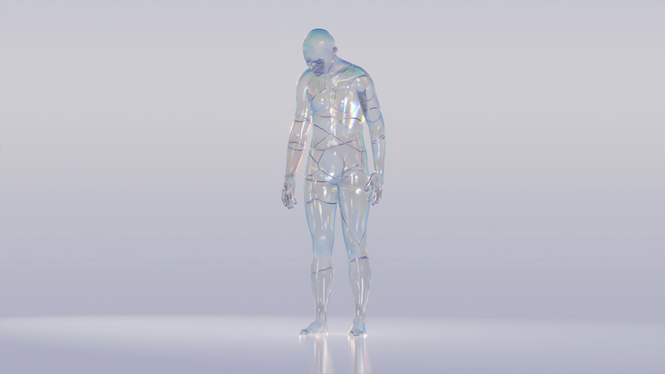The ‘Lurid Metaphors’ of Illness
Meghan O’Rourke recommends her favorite books about sickness and health.

This is an edition of the Books Briefing, our editors’ weekly guide to the best in books. Sign up for it here.
Sickness, like love and grief, is a universal part of the human condition—but it also feels completely subjective, so much so that conveying the accompanying sensations and emotions can be hard. Doctors sometimes ask patients to rate their pain on a scale of 1 to 10: Are you at a 5 or an 8? My mind always freezes in such moments. How can I know what 5 is if I don’t know what 10 feels like?
In Meghan O’Rourke’s much acclaimed 2022 book, The Invisible Kingdom, she combined her own medical experiences and copious research to try to understand chronic illnesses, a category of sickness that often evades medicine’s established definitions and classifications. These conditions can be capricious and are too frequently overlooked; patients constantly need to assert and prove themselves to a disbelieving world. It made perfect sense, then, for O’Rourke to write for The Atlantic’s June issue about a new cultural history of hypochondria, Caroline Crampton’s A Body Made of Glass. The health anxieties we think of today as hypochondria have a rich genealogy, and as O’Rourke writes, “Each era’s ideas track its limited understanding of health, and demonstrate a desire for clarity about the body and illness that again and again proves elusive.” I wanted to talk to O’Rourke about the books she thinks have most successfully confronted that elusiveness.
First, here are four new stories from The Atlantic’s Books section:
- Listen to what they’re chanting
- Miranda July’s weird road trip
- Six books that explore what’s out there
- Some late-breaking adjustments to my autobiography
This interview has been condensed and edited for clarity.
Gal Beckerman: Your essay explores the fascinating medical history of our changing understanding of hypochondria. I’m wondering if there are other history books on illness or medicine you might recommend—titles that give us a sense of how some concepts we take for granted have evolved?
Meghan O’Rourke: One of my favorite books about illness and medicine is Susan Sontag’s Illness as Metaphor, which asks us to reexamine the stories we tell ourselves, as a society, about illnesses we don’t understand. As she puts it, “Any important disease whose causality is murky, and for which treatment is ineffectual, tends to be awash in significance.” Sontag was interested in how, in the 1960s and ’70s, breast cancer was associated with emotional repression, such that people diagnosed with the condition faced a kind of moralizing attempt to explain the root of their disease. She traces the impulse, in modern Western society, to tell a story about the kinds of people who live with a given illness to tuberculosis, which was once thought to be a disease for “romantic” or artistic people. Illness as Metaphor is often read mistakenly as an argument that we shouldn’t talk about disease by using metaphorical language. But Sontag was really trying to capture cultural metaphors, not ones any individual uses to describe pain, say. As she puts it, powerfully, “It is hardly possible to take up one’s residence in the kingdom of the ill unprejudiced by the lurid metaphors with which it has been landscaped.” The “lurid metaphors” are those that get in the way of our understanding, on a society-wide level, that a disease is a biological phenomenon rather than a story we tell about that phenomenon. You can see them clustering around long COVID right now. We use them when we don’t understand a condition very well; writing my book, I was told by many people I interviewed that a person with autoimmune disease is usually a “type A” woman at war with herself. I find this entanglement of biology and storytelling fascinating, as did Sontag.
Beckerman: It seems memoirs that capture the experience of being sick have become their own mini-genre recently. Any in particular you like?
O’Rourke: There are many I like, but I adore Sarah Manguso’s The Two Kinds of Decay, about receiving a diagnosis of an unusual and very debilitating autoimmune disease when she was a college student. It’s funny, poetic, and insightful.
Beckerman: Fiction, because of its ability to capture subjectivity, is, I imagine, particularly good at telling us what it’s like to be ill. Any novels that come to mind for you in this vein?
O’Rourke: I’m currently reading Garth Greenwell’s forthcoming Small Rain, which has some fantastic writing about confronting our own imperiled embodiment. It’s a novel about a poet living in Iowa City who experiences a sudden catastrophic health event and endures a terrifying subsequent hospital stay; he learns from the intensive-care doctors that he almost died, and his world is turned upside down. What’s most interesting to me about it are the observations of what it is like to adjust to a painful new reality about your own existence. He couples these with a kind of “close reading” of the hospital’s ecosystem, noting all its absurdities and awfulness, but also acts of tenderness.
Some of the best things I’ve read on illness are actually journals or diaries: Alphonse Daudet’s In the Land of Pain, which collects journal fragments about living with late-stage syphilis in the late 19th century, or W. N. P. Barbellion’s account of living with and slowly dying from worsening multiple sclerosis, The Journal of a Disappointed Man. Barbellion was an avid naturalist. He began the diary when he was young, and so the book dramatizes—vividly—the way illness affects one’s hunger for life and possibility and can lead to radical insight. It’s a very beautiful book.
Beckerman: And finally, more generally, is there one book you would thrust into someone’s hands for understanding how to do this wonderful mix of memoir, history, and cultural analysis that you achieve in your own work?
O’Rourke: Margo Jefferson is a nonfiction writer who manages to combine the three in an always inventive and surprising way; Negroland is a masterpiece. I am also a big admirer of Eula Biss’s On Immunity: An Inoculation—an excellent, and brief, investigation of vaccine hesitancy, tied to her own experiences of raising a young son in a culture obsessed with wellness.
Hypochondria Never Dies
By Meghan O’Rourke
The diagnosis is officially gone, but health anxiety is everywhere.
What to Read
Codeine Diary, by Tom Andrews
Andrews, who died three years after this book was published, was a poet working at the University of Michigan when he slipped and fell on some ice—a nasty experience for anybody but a dangerous one for a hemophiliac like Andrews. Codeine Diary is an account of his hospitalization, of his brother’s death from kidney failure, and also of Andrews’s (successful) childhood attempt to get into the Guinness Book of World Records for clapping without a break. The whole book is funny and refreshingly free of self-pity, but Andrews’s descriptions of his extended hospital stays are most rewarding. He recounts tales of carefully befriending the nurses and trying to get pain medication (a labyrinthine task, he explains: “If the patient is able to find language, however inadequate … the doctor may take that very articulateness as a sign that the pain must not be as bad as the patient is letting on”). He and his wife pass the time by reading Waiting for Godot out loud during his stays; meanwhile, Andrews tries to figure out how to document the rich and sterile tedium of the place. “Sometimes the carapace of cliché that enshrouds the imagination seems impenetrable,” he writes, sincere tongue planted firmly in cheek, as he tries to compose a poem. But this book, at least, is wholly free of cliché. — B. D. McClay
From our list: Seven books that actually capture what sickness is like
Out Next Week
???? My First Book, by Honor Levy
???? Challenger, by Adam Higginbotham
???? Blue Ruin, by Hari Kunzru
Your Weekend Read

It’s Not a Rap Beef. It’s a Cultural Reckoning.
By Spencer Kornhaber
Beef is older than rap, but this showdown is new in its scale and velocity. When Jay-Z and Nas scrapped in the early 2000s, they did so at a time when rap was not quite yet synonymous with pop. But in today’s fractured musical ecosystem, the 37-year-old Drake, who has had 13 No. 1 hits on the Billboard Hot 100, and the 36-year-old Kendrick Lamar, the only rapper to ever win a Pulitzer, have achieved a rare level of name recognition. The most consequential rap beef ever, between Biggie and Tupac, simmered for months and unfolded via physical releases, local radio, and in-person dustups. By contrast, Drake and Lamar are using fast-twitch digital technologies to record tracks at whim, circulate them around the planet instantly, and feed a teeming ecosystem of commentators, remixers, fans, haters, and voyeurs.
When you buy a book using a link in this newsletter, we receive a commission. Thank you for supporting The Atlantic.
Explore all of our newsletters.
What's Your Reaction?




















